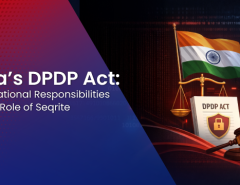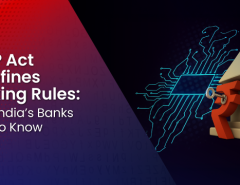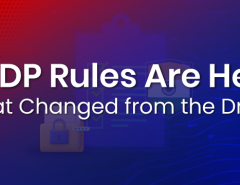India’s Banking, Financial Services, and Insurance (BFSI) industry stands at the intersection of innovation and risk. From UPI and digital wallets to AI-based lending and predictive underwriting, digital transformation is no longer a differentiator — it’s the operating model of the future.
In 2024, India’s fintech market was valued at approximately US$110 billion. By 2029, that figure is expected to soar to US$420 billion, reflecting an annual growth rate of 31%. With digital payments projected to exceed US$3.1 trillion by 2028, and over 9,000 fintechs already driving financial digitization, the new currency of the BFSI sector isn’t capital — it’s data.
Amid this transformation, the Digital Personal Data Protection (DPDP) Act, 2023 has emerged as a pivotal framework — not just a compliance mandate but a structural shift that will redefine trust, transparency, and data governance across the financial ecosystem.
Trust: The New Competitive Advantage
In an era where customer relationships are increasingly digital, trust has become the ultimate differentiator. The DPDP Act strengthens this foundation by restoring control to the individual — or as the law defines, the Data Principal.
Under the Act, customers gain the right to access, correct, and even request deletion of their data. For BFSI players, this means transparency is no longer optional — it’s strategic.
- India’s average data breach cost in 2023 stood at US$2.18 million.
- Customer skepticism around data handling is rising.
- The Act mandates informed, granular consent, ensuring customers know how and why their data is collected or shared.
Financial institutions that proactively embed these principles can transform compliance into a brand advantage, positioning themselves as trustworthy custodians of data in an increasingly skeptical market.
Cybersecurity: From Vulnerability to Core Capability
BFSI remains the most targeted industry for cyberattacks in India — and the numbers are stark.
- Between January and October 2023, the sector faced 1.3 million cyberattacks — roughly 4,400 per day.
- Phishing incidents grew by 175% in H1 2024, crossing 135,000 cases in six months.
- Over 1.1 million video KYC sessions occur daily, with spoofing rates as high as 86%.
The DPDP Act directly addresses these realities. Its security provisions mandate:
- Strong encryption and access controls
- Periodic security audits
- Data minimization, ensuring institutions store only what’s necessary
For CISOs and security leaders, this alignment between regulatory expectations and operational resilience represents an opportunity to elevate cybersecurity from a compliance task to a strategic defense layer.
Regulatory Harmony: A Unified Compliance Ecosystem
BFSI entities operate under multiple regulators — RBI, SEBI, and IRDAI, each with its distinct compliance landscape. The DPDP Act offers a unifying framework that complements existing sectoral regulations, creating clarity and consistency across overlapping requirements.
And the stakes are significant:
- The DPDP Act empowers the Data Protection Board to impose penalties up to ₹250 crore.
- In 2024, the RBI levied ₹56 crore in fines across 304 compliance cases — many tied to data protection and cybersecurity lapses.
The message is clear: compliance can no longer be reactive. Non-compliance is not only costly but reputationally irreversible.
Empowering the Customer Experience
Traditional blanket consent forms are becoming obsolete. Under the DPDP Act, consent must be explicit, informed, and revocable.
To meet these standards, BFSI organizations must implement:
- Consent management systems with intuitive, multilingual interfaces
- Real-time audit trails for traceability and accountability
- Customer-centric communication that reinforces transparency
Beyond compliance, these measures build deeper customer confidence — a competitive advantage that distinguishes data-responsible brands from the rest.
Innovation and Privacy: Coexistence, Not Compromise
Contrary to popular belief, the DPDP Act doesn’t constrain innovation — it enables it responsibly.
By allowing the use of anonymized or pseudonymized data for purposes such as:
- Fraud detection
- Risk assessment and modeling
- Product design and personalization
The law ensures BFSI players can continue to harness the power of AI, machine learning, and analytics, without compromising privacy. Even cross-border data transfers are permitted — provided robust safeguards are in place.
This balance between innovation and compliance positions India’s BFSI ecosystem as a global benchmark in ethical data innovation.
Key Imperatives for BFSI Leaders
To align with the DPDP Act, BFSI organizations must prioritize:
- Comprehensive consent frameworks
- Enterprise-grade security controls (encryption, MFA, continuous monitoring)
- Breach response and reporting protocols
- Data lifecycle management – retention, anonymization, secure disposal
- Third-party and vendor compliance oversight
- Appointment of a Data Protection Officer (DPO) for accountability
However, this transformation goes beyond checklists. It’s about embedding privacy into the organizational culture, ensuring that every process, product, and partnership is built on the principle of “privacy by design.”
Building the DPDP Roadmap
Forward-looking financial institutions are already operationalizing compliance through structured roadmaps:
- Data Mapping – Understanding where and how data flows across the enterprise.
- Governance Alignment – Synchronizing internal policies with RBI, SEBI, and IRDAI frameworks.
- Technology Investments – Deploying consent management tools, governance platforms, and advanced cybersecurity solutions.
- Employee Training – Creating awareness across all business units.
- Continuous Monitoring – Shifting from annual audits to real-time compliance tracking.
Conclusion: Turning Compliance into Competitive Edge
Between 2019 and 2023, India’s BFSI cybersecurity investments tripled — from US$518 million to US$1.7 billion. The DPDP Act builds on this momentum, not as a disruptor, but as an accelerator of secure digital transformation.
Institutions that embrace this regulation early will stand apart — as leaders in trust, resilience, and responsible innovation.
The DPDP Act is not the end of compliance — it’s the foundation of a privacy-first future for India’s financial ecosystem. The question isn’t whether BFSI organizations will comply, but how effectively they’ll leverage compliance to lead
Stay ahead of India’s evolving privacy landscape with Seqrite’s DPDP Act Compliance Services — a comprehensive framework to help BFSI institutions safeguard data, ensure regulatory alignment, and build customer trust.
Turn compliance into a competitive advantage with Seqrite’s end-to-end data protection, governance, and security expertise.




